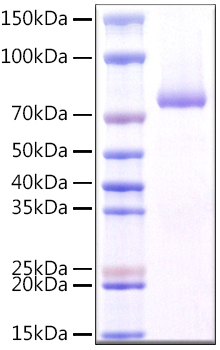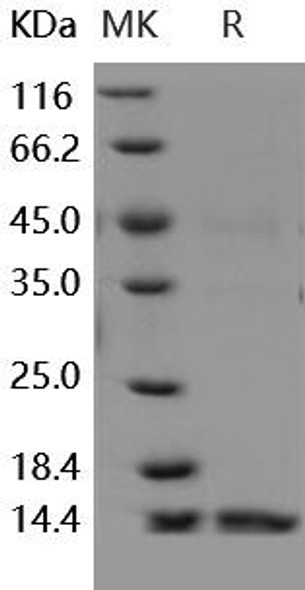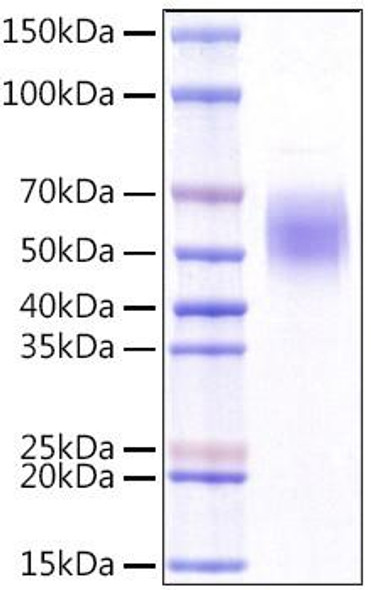Description
Recombinant Human CLEC7A/Dectin-1/CD369 Protein
The Recombinant Human CLEC7A/Dectin-1/CD369 Protein is a biologically active recombinant protein that plays a significant role in various cellular processes and signaling pathways in human biology. This protein is widely employed in immunological research, cell biology studies, protein-protein interaction analyses, and therapeutic development, providing researchers with a reliable tool for investigating CLEC7A/Dectin-1/CD369 function and its implications in health and disease.
This product (SKU: RPCB0982) is produced using HEK293 cells and features a N-Rabbit Fc tag for convenient detection and purification. The protein exhibits a calculated molecular weight of 46.19 kDa with an observed molecular weight of 70-80 kDa under denaturing conditions, achieving ≥ 95 % as determined by SDS-PAGE., ensuring exceptional quality and consistency for research applications.
Key Features
| High Purity by Affinity Chromatography | |
| Mammalian & Bacterial Expression Systems | |
| High lot-to-lot consistency via strict QC |
| Product Name: | Recombinant Human CLEC7A/Dectin-1/CD369 Protein |
| SKU: | RPCB0982 |
| Size: | 10 μg , 20 μg , 50 μg , 100 μg |
| Reactivity: | Human |
| Synonyms: | CLEC7A, BGR, CANDF4, CLECSF12, DECTIN1, SCARE2, CD369 |
| Tag: | N-Rabbit Fc |
| Expression Host: | HEK293 cells |
| Calculated MW: | 46.19 kDa |
| Observed MW: | 70-80 kDa |
| Gene ID: | 64581 |
| Protein Description: | High quality, high purity and low endotoxin recombinant Recombinant Human CLEC7A/Dectin-1/CD369 Protein (RPCB0982), tested reactivity in HEK293 cells and has been validated in SDS-PAGE.100% guaranteed. |
| Endotoxin: | < 0.1 EU/μg of the protein by LAL method. |
| Purity: | ≥ 95 % as determined by SDS-PAGE. |
| Formulation: | Lyophilized from a 0.22 μm filtered solution of PBS, pH 7.4. |
| Reconstitution: | Centrifuge the vial before opening. Reconstitute to a concentration of 0.1-0.5 mg/mL in sterile distilled water. Avoid vortex or vigorously pipetting the protein. For long term storage, it is recommended to add a carrier protein or stablizer (e.g. 0.1% BSA, 5% HSA, 10% FBS or 5% Trehalose), and aliquot the reconstituted protein solution to minimize free-thaw cycles. |
| Storage: | Store at -20℃.Store the lyophilized protein at -20℃ to -80 ℃ up to 1 year from the date of receipt. After reconstitution, the protein solution is stable at -20℃ for 3 months, at 2-8℃ for up to 1 week. |
Dectin-1 was recently identified as the most important receptor for beta-glucan. It is a type II transmembrane protein which binds beta-1,3 and beta-1,6 glucans, and is expressed on most cells of the innate immune system and has been implicated in phagocytosis as well as killing of fungi by macrophages, neutrophils and dendritic cells. Recognition of beta-glucan by dectin-1 triggers effective immune response, including phagocytosis and proinflammatory factor production, to eliminate infecting fungi, which especially benefits immunocompromised patients against opportunistic fungal infection. In addition, dectin-1 is involved in the adaptive immune response as well as autoimmune diseases and immune tolerance. Dectin-1 can recognize and respond to live fungal pathogens and is being increasingly appreciated as having a key role in the innate responses to these pathogens. In addition to its exogenous ligands, Dectin-1 can recognize an unidentified endogenous ligand on T cells and may act as a co-stimulatory molecule. Recent studies have highlighted the importance of Dectin-1 in anti-fungal immunity, in both mice and humans, and have suggested a possible involvement of this receptor in the control of mycobacterial infections.







